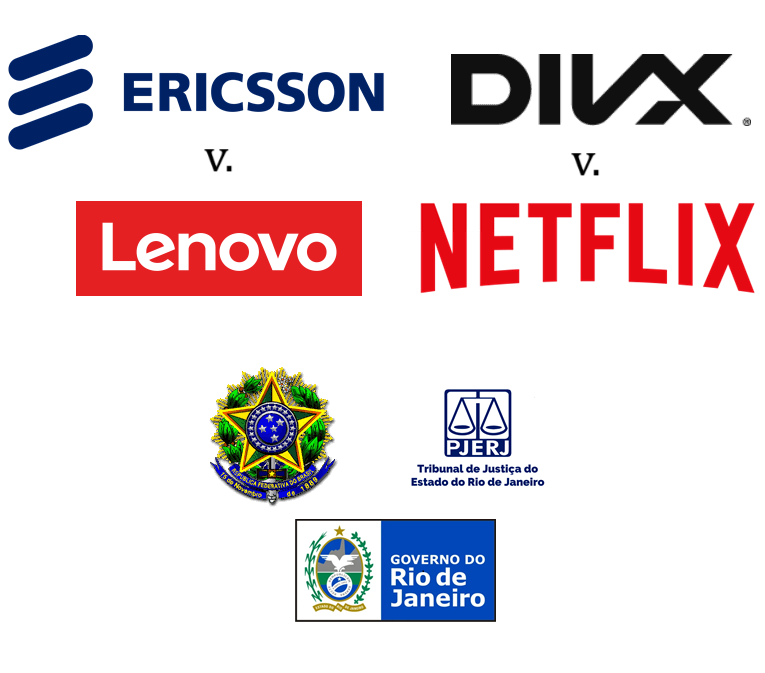Context: The patent dispute between DivX and Netflix has been going for years while Ericsson sued Lenovo just recently. The previous ip fray article discussed three preliminary injunctions (PIs) Ericsson obtained against Lenovo in another Latin American jurisdiction: Colombia.
What’s new: Both defendants suffered significant defeats in Brazil this month, with a Brazilian PI against Lenovo over two cellular standard-essential patents (SEPs) and DivX having scored the first-ever trial win in Brazil over a video codec SEP, which is at the same time the first-ever trial win there over an information and communications technology patent.
Direct impact: Netflix is now facing a fully enforceable injunction and owes damages of an amount to be determined. Lenovo may temporarily get away with making interim payments, but sees another Damocles sword hanging above its head.
Wider ramifications: Both developments will contribute to the popularity of Brazil as a jurisdiction in which to enforce technology patents and particularly SEPs. Just like the above-mentioned Colombian PIs, this shows SEP holders have alternative enforcement options should the European Union slow down SEP enforcement in the bloc’s member states.
Brazilian law firm Licks Attorneys made two of its clients and itself some Christmas presents by scoring significant victories for Ericsson over Lenovo and for the relatively small video technology company DivX over Netflix.
ip fray has obtained and analyzed court documents from proceedings before the Estado do Rio de Janeiro Poder Judiciário – Tribunal de Justiça (Court of Justice of the Judiciary of the State of Rio de Janeiro).
Ericsson v. Lenovo: PI over two patents
On November 24, 2023 (i.e., exactly one month before this article was written), the Brazilian court granted Ericsson a preliminary injunction against Lenovo’s Motorola Mobility subsidiary over two Brazilian patents:
- BR112019015387 on “5G security context handling during connected mode” and
- BR112020001538 on “method performed by an authentication server on a domestic network of user equipment, method performed by a discharge server, user equipment and method performed by the same”
These 5G SEPs are rather young. They are not set to expire before 2038.
The accused devices listed in the decision include Moto Edge, Moto G and ThinkPhone. In its motion, Ericsson’s lawyers made an argument for irreparable harm based on the fact that major smartphone makers are already licensed to those patents. It is well known that Ericsson reached license agreements with Apple and Samsung in recent years. Since that PI decision came down, Ericsson has also agreed on a renewal with Xiaomi (paywalled IAM report).
If the past is any indication, a removal of Lenovo’s Motorola phones from the Brazilian market is not imminent, but the noose is tightening and it could happen further down the road.
DivX v. Netflix: historic decision
Normally, Brazilian patent infringement actions in this industry do not reach the stage of a trial and final (i.e., post-trial) judgment. Typically those disputes are settled before. DivX v. Netflix is an exception, despite the fact that cases are pending in a couple of different jurisdictions.
On December 8, 2023, the Rio de Janeiro-based court entered a final judgment against Netflix over Brazilian patent BRPI0506163A on a “video unlock filter”. The patent was deemed essential to the HEVC (H.265) video codec standard.
The Motion Picture Association America Latina (MPA-AL), whose members include Netflix itself (through its Netflix Studios division) as well as Disney, Paramount, Sony, Universal and Warner, filed an amicus brief in support of its member. The outcome, however, shows that the submission did not persuade the court.
As a result of its trial loss, Netflix is now facing a permanent injunction (previously, only a preliminary one was in place). The court has declared that Netflix owes DivX damages, which will have to be determined subsequently by the same judge who presided over the merits trial. Furthermore, Netflix must reimburse DivX’s litigation expenses.
The question is now whether Netflix will appeal the decision or take a license.
Latin American venues and firms at forefront of SEP enforcement stand to benefit
Primarily, these developments will encourage patent holders to enforce their rights in the jurisdictions in which those decisions came down. This article discussed certain Brazilian decisions, and the previous one covered three Colombian PIs. It will be interesting to see whether patent holders and particularly SEP holders will now be encouraged to bring experimental lawsuits in other Latin American jurisdictions as well. While the European Union’s legislative process relating to an EU SEP Regulation may ultimately turn out inconsequential, it could also do significant harm to right holders (which doesn’t necessarily mean that implementers stand to benefit on the bottom line). Venue diversification is therefore an important exercise for SEP holders.
In Brazil, the Licks Attorneys firm has a de facto monopoly on SEP enforcement, not in an antitrust sense. All SEP holders who brought infringement claims there have so far relied on that one firm.

